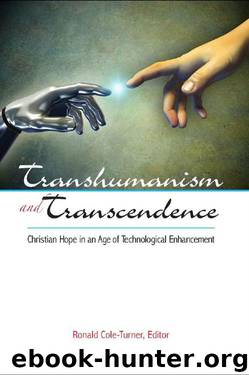Transhumanism and Transcendence: Christian Hope in an Age of Technological Enhancement by Ronald Cole-Turner

Author:Ronald Cole-Turner [Cole-Turner, Ronald]
Language: eng
Format: epub
ISBN: 9781589017801
Amazon: 1589017803
Publisher: Georgetown University Press
Published: 2011-09-29T00:00:00+00:00
of obligation to create a new human future. In this he perceives enhance-
ments fitting in to a view of what might be broadly termed human “evolu-
tion,” understood as a human construction. He goes as far as to suggest that
we need to replace natural selection with deliberate selection and Darwin-
ian evolution with enhancement evolution. 3 He believes, therefore, that the
potential of humanity can only be reached by taking such deliberate steps,
achieved through enhancement technologies. He also reinforces this by sug-
gesting that there was never a time when humans did not try and improve
their lot, as “ape-descended” persons. 4 Here he seems to be using a natural-
istic Darwinian argument, that because even our early ancestors were pre-
sumably selected to try and improve their situation, then we should do the
same. The difference is that now, according to him, evolution is within our
powers to manipulate. 5 I suggest that beginning with such an analysis helps
to explain the significance of those particular cases of enhancement that
seem at first sight to be reasonable and realistic.
Bostrom is an atheist philosopher and transhuman activist who, paradox-
ically perhaps, has written on the philosophical aspects of global risk tak-
ing, as well as promoting his own version of transhuman philosophy.6 In a
manner reminiscent of forecasts made by economists or policymakers, he
taking leave o the animal 117
envisages four scenarios for humanity’s future evolution: extinction, recur-
rent collapse, plateau, and posthumanity. He believes that his own approach
builds on what is possible at the moment, rather than being invented through
science fiction or theology—which he understands as, for example, just one
screen for our hopes and fears, or a means whereby ideology is mobilized.7
For him, technology drives economic growth; hence, our projections of
technology are strongly correlated with human development. His optimistic
view of technology leads to a more or less linear development, where all
possible human capabilities that can be attained through technology will be
attained. He names such a position in grandiose terms as the “Technological
Completion Conjecture.”8 Although he refrains from using the word “prog-
ress,” his observation that each new generation is more “advanced” than its
predecessor implies a positive outcome.
He also believes that positive outcomes will happen in one scenario,
which he names as the posthuman one. His argument for posthumanism
sounds attractive when placed alongside the three other scenarios. The pos-
sibility of a plateau, which maintains the status quo, is implausible for him
because he believes it is unrealistic. 9 The most important technological devel-
opments for him, and for the topic of this chapter, are those that impinge
directly on human biology. Here he speaks positively in terms of the control
of human senescence, so that life expectancy is about 1,000 years; and happi-
ness is enhanced by the “control of brain circuitry responsible for subjective
well being,” the use of drugs, and other neurotechnologies in order to adjust
“personality, emotional character, mental energy, romantic attachments and
moral character. Cognitive enhancements might deepen our intellectual
lives.”10 Such developments are, he suggests, within the bounds of physical possibility.11 There are, however, complexity barriers worth considering,
which means that highly complex systems go wrong in unexpected ways,
though he is reluctant to admit that this would apply to all technologies
enabling a posthuman condition.
Download
This site does not store any files on its server. We only index and link to content provided by other sites. Please contact the content providers to delete copyright contents if any and email us, we'll remove relevant links or contents immediately.
The Secret Power of Speaking God's Word by Joyce Meyer(3178)
Signature in the Cell: DNA and the Evidence for Intelligent Design by Stephen C. Meyer(3130)
Real Sex by Lauren F. Winner(3014)
The Holy Spirit by Billy Graham(2944)
The Gnostic Gospels by Pagels Elaine(2527)
Jesus by Paul Johnson(2352)
Devil, The by Almond Philip C(2324)
23:27 by H. L. Roberts(2248)
The Nativity by Geza Vermes(2226)
Chosen by God by R. C. Sproul(2161)
All Things New by John Eldredge(2159)
Angels of God: The Bible, the Church and the Heavenly Hosts by Mike Aquilina(1957)
The Return of the Gods by Erich von Daniken(1942)
Angels by Billy Graham(1922)
Knowing God by J.I. Packer(1854)
Jesus of Nazareth by Joseph Ratzinger(1811)
The Gnostic Gospel of St. Thomas by Tau Malachi(1793)
Evidence of the Afterlife by Jeffrey Long(1786)
How To Be Born Again by Billy Graham(1777)
